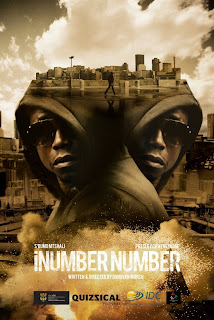It’s not surprising that
in the shantytowns outside Johannesburg, most cops have gone corrupt. Soweto is
a land of lawlessness, where every cop goes through a dilemma; risk their lives
on a daily basis to enforce the law for a meager salary, or join the crime
lords and live like kings.
The last two good cops left in Soweto township of South
Africa are Chili (S’dumo Mtshali) and Shoes (Presley Chweneyagae). Against all
odds they still manage to work together to put away the bad guys without any
assistance from the rest of the corrupt police force.
The film begins with an exhilarating opening sequence that
has Chili’s cover blown and tied to a chair about to be tortured or killed.
It’s Shoe to the rescue, but he has no weapons, only a walkie-talkie to
communicate with his partner and no time to call for backup. Outnumbered, the
two must work together to put a bold plan into action.
Writer and director Donovan Marsh, influenced by such
masters of the gangster and heist genre as Tarantino and the Coen Brothers,
tells a sometimes absurdly tragic/comic story of a hastily planned robbery of
an armored money truck in transit, which is apparently common in the extremely
dangerous poor parts of South Africa, where people are so desperate, they often
resort to poorly thought out schemes to get rich quick.
Our cop buddies and best friends are an unlikely duo to be
reckoned with; Chili is the hulking muscle with nerves of steel able to
infiltrate any crime gang convincingly, while Shoes is the loveable experienced
voice of reason on the outside looking in, making sure his partner doesn’t get
himself killed.
The strikingly stylish sepia tinged images give a rich
texture that exudes a feeling of oppressive heat. Visually, it almost felt like
watching Danny Boyle’s Slumdog Millionaire
(2008), with its extreme camera angles and filtered lenses giving an ant’s eye
view of the scorched world that seems to give the camera, free to move into the
smallest spaces, a life of its own and the resulting images are nothing short
of spectacular.
After being denied the reward owed to them, Chili,
conflicted about continuing on their righteous path, decide to help a group of
criminals to rob an armored truck and make some quick easy cash. Shoes
reluctantly agrees to go along with the plan but in Soweto nothing goes as
planned and soon our two hero cops are neck deep in a suspenseful bloody show
down.
Filmed in actual locations in the Soweto Township of
Johannesburg South Africa, the film is a non-stop adrenalin rush that doesn’t
let up. The situations and thrilling set pieces are so inventively filmed with
an array of in-camera visual effects like stop motion, fast motion and slow
motion that help give the film a frenetic feeling that engages the audience to
experience the film in an immersive way.
The organic home grown soundtrack, which was actually
performed by one of the cast members, who himself was a real gangster and a musician in
Soweto, helps to give the film an authentic feel.
iNumber Number
(2013), the title of the film is Zulu gangster slang for a crime job, had its
world premiere here in Toronto on Sept. 12, 2013 and is scheduled for a big
release in South Africa in March 2014, and in North American by XYZ films. Don’t
miss this extremely entertaining must-see film for action fans.
JP









